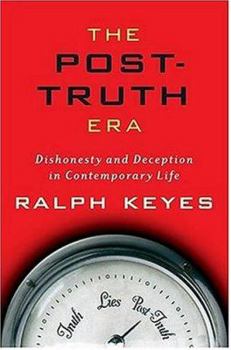The Post-Truth Era: Dishonesty and Deception in Contemporary Life
Select Format
Select Condition 
Book Overview
"Dishonesty inspires more euphemisms than copulation or defecation. This helps desensitize us to its implications. In the post-truth era we don't just have truth and lies but a third category of ambiguous statements that are not exactly the truth but fall just short of a lie. Enhanced truth it might be called. Neo-truth. Soft truth. Faux truth. Truth lite ." Deception has become the modern way of life. Where once the boundary line between truth and...
Format:Hardcover
Language:English
ISBN:0312306482
ISBN13:9780312306489
Release Date:October 2004
Publisher:St. Martin's Press
Length:320 Pages
Weight:1.06 lbs.
Dimensions:1.1" x 5.9" x 8.5"
Customer Reviews
3 ratings
A Pants-on-Fire Epidemic!
Published by Thriftbooks.com User , 16 years ago
This book makes a great case for the fact that lying is getting easier, and people are engaging in it more often, primarily because of mobility and technology, and is tearing away at the fabric of society. To function well, a society needs to have a bias for truth, so that we are fairly confident that most of the time people and institutions are telling us the truth. The alternative, a bias for untruth, leads to mistrust and the inability to function smoothly, and results in both a personal cost to our sense of self and an economic cost in terms of a truth tax that is imposed by protracted negotiations, lawyers, etc. Keyes covers the many aspects of lying, including how it eventually affects the liar. He also provides a lot of interesting examples of lying in the business world, in literature, in politics and in Hollywood -there are some real eye openers here - as well as an engaging exposition on those who defend lying and why. Keyes concludes convincingly with the need to have a bias for truth, although a reasonable one at that. Keyes' writing is tight and he skillfully weaves supporting quotes from various sources. The book is a quick read and one that helps you understand the current condition of truthtelling, and its prognosis.
An Entertaining Yet Challenging Read
Published by Thriftbooks.com User , 19 years ago
This book manages to be highly entertaining even while it requires readers to think hard about important questions about how we live and the kind of society to which we belong. As is usual in Keyes' work, he has researched every conceivable point of view and bit of evidence on the matter: we learn and wonder about casual lies of Hillary Clinton; why the lies of Reagan and Oliver North were forgiven and those of Al Gore were not; and get a bipartisan look at the styles of lying of both Bill Clinton and George W. Bush. The book features the lies many political, judicial, literary, academic leaders have told and offers a fascinating analysis of the many reasons they may have done so. We learn that the average American tells one lie a day; that both sexes lie equally, but in different ways; and that an early Puritan method for catching liars was the "ultimate no win:" put under water, liars would float and therefore survive to be executed; truth tellers would sink and be vindicated though drowned. The author of Is There Life After High School? and ten other works of honest, comprehensive and human commentaries on how we live today, Keyes combines humor with ethical concerns and compelling insight. The reader is treated to "A Brief History of Lying" which puts our current dilemma into historical context. The problem is not that we are the first generation to lie: it is that we are increasingly willing to believe that it doesn't matter if we lie; that a lie can be considered a "deeper truth" or that we no longer have to make distinctions between what is true and what can be made true. Keyes examines the consequences of an increased indifference to lying in terms of the trust that is required between people who need and depend on each other. Having taken us to the bleak awareness of the extent of untruth in our society, he shows compassion for the dilemma of those struggling with the truth. He relates examples of how individuals and communities opt for honesty and describes ways in which people can consciously relearn the value and satisfaction of being known as themselves rather than through false words and histories. Reviewed by Charles O'Leary
Required Reading For All Americans
Published by Thriftbooks.com User , 20 years ago
This well-researched and cogently written expose should be required reading for all Americans. Mr. Keyes utilizes both anecdotal evidence, and to the extent it is available, statistics and other evidence, to demonstrate that "truth" is a rapidly vanishing value in our current society. He then explains that the ramifications of this value decline are significant; the ability to be able to "presume" honesty is at the core of our relationships, both personal, financial, and professional. Indeed, dishonesty is our society is so prevelant that the truth-teller is currently at a distinct disadvantage. The witness is a judicial proceeding who tells the truth without embellishment will be discounted, as judges and juries presume that the witness, like all those before them, has exagerrated. Similarly, the job applicant who does not fudge will be rejected, as fudging is now presumed. Despite its weighty subject, Mr. Keyes' writing style is engaging. Moreover, the validity of Mr. Keyes' points are reinforced by everyday life. I highly recommend this book.





